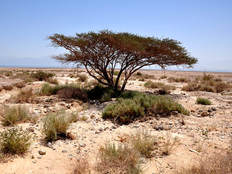weekly column
|
Each week, find a commentary on something connected to verses of Torah or another source of wisdom
|
|
Each week, find a commentary on something connected to verses of Torah or another source of wisdom
|
 The Exodus:5 Project Make the poles of acacia wood, and overlay them with gold. Exodus 30:5 Do not read the rest of this column if you are offended by four-letter words and making fun of accented English. You are forewarned. Many years ago, during one of my congregation’s trips to Israel, I was talking with a guide outside of Eilat. He was about to lead us on an ATV ride through the desert (highly recommended) and was getting ready to tell these Americans what they would see. His English was as acceptable as my Hebrew, but there were certain specialized vocabularies he had yet to master. Eikh kor’im la’eitz hazeh ba’Anglit? he asked. (What do you call this tree in English?) Eizeh min eitz zeh? I replied. (What kind of tree is it?) Shittim, he said. Acacia, I answered. Lamah acacia? he asked. (Why “acacia?”) I was faced with a dilemma. The Hebrew and English names had nothing to do with each other, but the fact is that most American Jews are completely unfamiliar with the Hebrew name. A Hebrew folk song, sung primarily around Tu B’Shvat, the Jewish arbor day, takes its lyrics from a brief Biblical verse that means “acacia trees are standing.” The Hebrew lyrics are atzei shittim omdim. You simply cannot teach sixth-grade American children to say shittim over and over again, especially if the lyrics are set to a Latin melody most often accompanied by a conga line. So some tight-ass Hebrew school principal changed the words from “acacia trees” to “olive trees” and Hebrew school students in this country grew up singing atzei zeitim omdim. Apparently when it comes to parental outrage, changing the Bible is acceptable. Of course, there are classic stories that circulate among Jewish educators about Israelis who find their way to the US and commit their own profane faux-pas. They may be urban legends, but they are told (like all good urban legends) by people who swear they heard them from a reliable source. My favorite is about the Israeli camping counselor who instructed his charges to prepare for the upcoming overnight: Tonight, we slip on the bitch. If you don’t want to have sand, bring two shits. If your foots they get cold, bring sucks. And if you have allergies, let me know because we will eat penis butter. I don’t want to sound too smug, having entered a makolet (bodega) in Jerusalem as a long-haired young man looking for spices. Instead of using the modern Hebrew word, I mispronounced the last word of the blessing over the spices that end Shabbat and asked the owner for illegal drugs. I subsequently shopped elsewhere. It’s not just Hebrew and English that can offend each other unintentionally. My grandfather, of blessed memory, was wise never to go to Paris. A plumber by trade, he told people many times about the French plumber who greeted everyone with “Bum sewer.” German stores that sell jewelry advertise themselves as merchants of “schmuck.” And true or not, a Persian friend once told my wife that she wanted to find another name to call her because her name in Farsi meant…well, it sounds like acacia in Hebrew. Anyway, I had to answer the guide with something. So when he said, “Lamah acacia?” I paused a moment and decided on the only answer I could give him. “Lamah shittim?” He was satisfied.
0 Comments
Leave a Reply. |
Archives
October 2023
Categories |